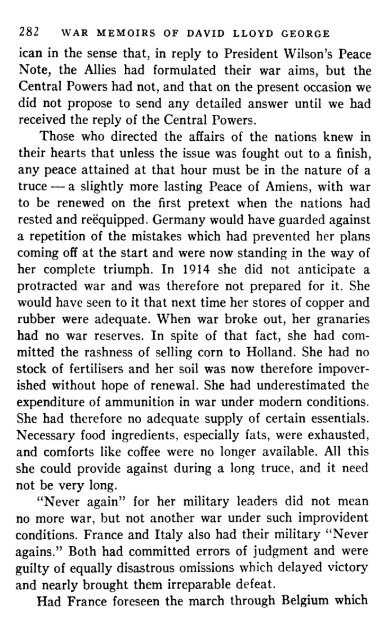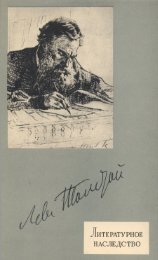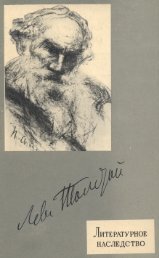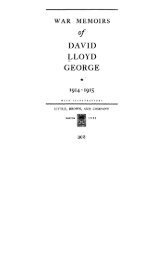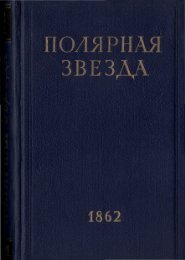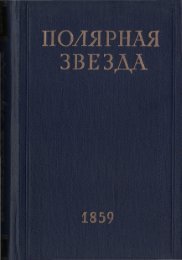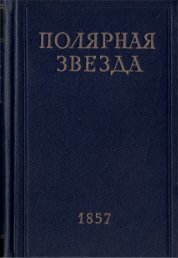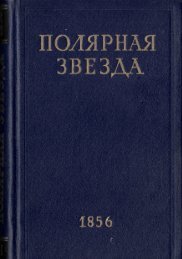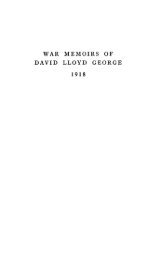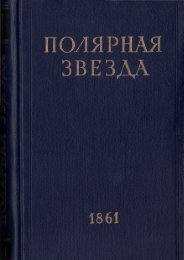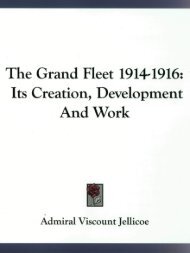- Page 1 and 2:
WAR MEMOIRS OF DAVID LLOYD GEORGE 1
- Page 3 and 4:
Copyright, 1934, BY DAVID LLOYD GEO
- Page 5 and 6:
ILLUSTRATIONS THE IMPERIAL WAR CABI
- Page 7 and 8:
CHAPTER I THE IMPERIAL WAR CABINET
- Page 9 and 10:
IMPERIAL WAR CABINET AND CONFERENCE
- Page 11 and 12:
IMPERIAL WAR CABINET AND CONFERENCE
- Page 13 and 14:
IMPERIAL WAR CABINET AND CONFERENCE
- Page 15 and 16:
IMPERIAL WAR CABINET AND CONFERENCE
- Page 17 and 18:
IMPERIAL WAR CABINET AND CONFERENCE
- Page 19 and 20:
IMPERIAL WAR CABINET AND CONFERENCE
- Page 21 and 22:
IMPERIAL WAR CABINET AND CONFERENCE
- Page 23 and 24:
IMPERIAL WAR CABINET AND CONFERENCE
- Page 25 and 26:
IMPERIAL WAR CABINET AND CONFERENCE
- Page 27 and 28:
IMPERIAL WAR CABINET AND CONFERENCE
- Page 29 and 30:
IMPERIAL WAR CABINET AND CONFERENCE
- Page 31 and 32:
IMPERIAL WAR CABINET AND CONFERENCE
- Page 33 and 34:
IMPERIAL WAR CABINET AND CONFERENCE
- Page 35 and 36:
IMPERIAL WAR CABINET AND CONFERENCE
- Page 37 and 38:
IMPERIAL WAR CABINET AND CONFERENCE
- Page 39 and 40:
IMPERIAL WAR CABINET AND CONFERENCE
- Page 41 and 42:
APPENDIX A PRIME MINISTER'S STATEME
- Page 43 and 44:
IMPERIAL WAR CABINET AND CONFERENCE
- Page 45 and 46:
IMPERIAL WAR CABINET AND CONFERENCE
- Page 47 and 48:
IMPERIAL WAR CABINET AND CONFERENCE
- Page 49 and 50:
IMPERIAL WAR CABINET AND CONFERENCE
- Page 51 and 52:
IMPERIAL WAR CABINET AND CONFERENCE
- Page 53 and 54:
IMPERIAL WAR CABINET AND CONFERENCE
- Page 55 and 56:
IMPERIAL WAR CABINET AND CONFERENCE
- Page 57 and 58:
APPENDIX B AGENDA FOR THE FORTHCOMI
- Page 59 and 60:
IMPERIAL WAR CABINET AND CONFERENCE
- Page 61 and 62:
IMPERIAL WAR CABINET AND CONFERENCE
- Page 63 and 64:
IMPERIAL WAR CABINET AND CONFERENCE
- Page 65 and 66:
IMPERIAL WAR CABINET AND CONFERENCE
- Page 67 and 68:
APPENDIX D SUMMARY OF REPORT OF LOR
- Page 69 and 70:
CHAPTER II THE STRUGGLE WITH THE TU
- Page 71 and 72:
THE STRUGGLE WITH THE TURK 67 Turki
- Page 73 and 74:
THE STRUGGLE WITH THE TURK 69 Pales
- Page 75 and 76:
THE STRUGGLE WITH THE TURK 71 of Sh
- Page 77 and 78:
THE STRUGGLE WITH THE TURK 73 confi
- Page 79 and 80:
THE STRUGGLE WITH THE TURK 75 how t
- Page 81 and 82:
THE STRUGGLE WITH THE TURK 77 would
- Page 83 and 84:
THE STRUGGLE WITH THE TURK 79 Baghd
- Page 85 and 86:
THE STRUGGLE WITH THE TURK 81 indef
- Page 87 and 88:
THE STRUGGLE WITH THE TURK 83 into
- Page 89 and 90:
THE STRUGGLE WITH THE TURK 85 At bo
- Page 91 and 92:
THE STRUGGLE WITH THE TURK 87 westw
- Page 93 and 94:
THE STRUGGLE WITH THE TURK 89 acros
- Page 95 and 96:
THE STRUGGLE WITH THE TURK 91 there
- Page 97 and 98:
THE STRUGGLE WITH THE TURK 93 under
- Page 99 and 100:
THE STRUGGLE WITH THE TURK 95 Rober
- Page 101 and 102:
THE STRUGGLE WITH THE TURK 97 Gaza.
- Page 103 and 104:
THE STRUGGLE WITH THE TURK 99 press
- Page 105 and 106:
THE STRUGGLE WITH THE TURK 101 defe
- Page 107 and 108:
CREATING THE AIR MINISTRY 103 advan
- Page 109 and 110:
CREATING THE AIR MINISTRY 105 lins
- Page 111 and 112:
CREATING THE AIR MINISTRY 107 the C
- Page 113 and 114:
CREATING THE AIR MINISTRY 109 found
- Page 115 and 116:
CREATING THE AIR MINISTRY 111 Board
- Page 117 and 118:
CREATING THE AIR MINISTRY 113 inven
- Page 119 and 120:
CREATING THE AIR MINISTRY 115 assum
- Page 121 and 122:
CREATING THE AIR MINISTRY 117 popul
- Page 123 and 124:
CREATING THE AIR MINISTRY 119 Defen
- Page 125 and 126:
CREATING THE AIR MINISTRY 121 This
- Page 127 and 128:
CREATING THE AIR MINISTRY 123 R.N.A
- Page 129 and 130:
CREATING THE AIR MINISTRY 125 matte
- Page 131 and 132:
CREATING THE AIR MINISTRY 127 tions
- Page 133 and 134:
CREATING THE AIR MINISTRY 129 dange
- Page 135 and 136:
CREATING THE AIR MINISTRY 131 factu
- Page 137 and 138:
STOCKHOLM AND MR. ARTHUR HENDERSON
- Page 139 and 140:
STOCKHOLM AND MR. ARTHUR HENDERSON
- Page 141 and 142:
STOCKHOLM AND MR. ARTHUR HENDERSON
- Page 143 and 144:
STOCKHOLM AND MR. ARTHUR HENDERSON
- Page 145 and 146:
STOCKHOLM AND MR. ARTHUR HENDERSON
- Page 147 and 148:
STOCKHOLM AND MR. ARTHUR HENDERSON
- Page 149 and 150:
STOCKHOLM AND MR. ARTHUR HENDERSON
- Page 151 and 152:
STOCKHOLM AND MR. ARTHUR HENDERSON
- Page 153 and 154:
STOCKHOLM AND MR. ARTHUR HENDERSON
- Page 155 and 156:
STOCKHOLM AND MR. ARTHUR HENDERSON
- Page 157 and 158:
STOCKHOLM AND MR. ARTHUR HENDERSON
- Page 159 and 160:
STOCKHOLM AND MR. ARTHUR HENDERSON
- Page 161 and 162:
STOCKHOLM AND MR. ARTHUR HENDERSON
- Page 163 and 164:
STOCKHOLM AND MR. ARTHUR HENDERSON
- Page 165 and 166:
STOCKHOLM AND MR. ARTHUR HENDERSON
- Page 167 and 168:
STOCKHOLM AND MR. ARTHUR HENDERSON
- Page 169 and 170:
STOCKHOLM AND MR. ARTHUR HENDERSON
- Page 171 and 172:
STOCKHOLM AND MR. ARTHUR HENDERSON
- Page 173 and 174:
CHAPTER V PROBLEMS OF LABOUR UNREST
- Page 175 and 176:
PROBLEMS OF LABOUR UNREST 171 Happi
- Page 177 and 178:
PROBLEMS OF LABOUR UNREST 173 forci
- Page 179 and 180:
PROBLEMS OF LABOUR UNREST 175 meant
- Page 181 and 182:
PROBLEMS OF LABOUR UNREST 177 all w
- Page 183 and 184:
PROBLEMS OF LABOUR UNREST 179 works
- Page 185 and 186:
PROBLEMS OF LABOUR UNREST 181 The p
- Page 187 and 188:
PROBLEMS OF LABOUR UNREST 183 that
- Page 189 and 190:
PROBLEMS OF LABOUR UNREST 185 Inter
- Page 191 and 192:
PROBLEMS OF LABOUR UNREST 187 As a
- Page 193 and 194:
PROBLEMS OF LABOUR UNREST 189 duty
- Page 195 and 196:
PROBLEMS OF LABOUR UNREST 191 There
- Page 197 and 198:
PROBLEMS OF LABOUR UNREST 193 of in
- Page 199 and 200:
PROBLEMS OF LABOUR UNREST 195 the a
- Page 201 and 202:
PROBLEMS OF LABOUR UNREST 197 prepa
- Page 203 and 204:
PROBLEMS OF LABOUR UNREST 199 Indus
- Page 205 and 206:
PROBLEMS OF LABOUR UNREST 201 Count
- Page 207 and 208:
CHAPTER VI ELECTORAL REFORM Outstan
- Page 209 and 210:
ELECTORAL REFORM 205 which a Genera
- Page 211 and 212:
ELECTORAL REFORM 207 When therefore
- Page 213 and 214:
ELECTORAL REFORM 209 stituencies th
- Page 215 and 216:
ELECTORAL REFORM 211 mendations of
- Page 217 and 218:
ELECTORAL REFORM 213 Parliament bef
- Page 219 and 220:
ELECTORAL REFORM 215 inclusion of s
- Page 221 and 222:
ELECTORAL REFORM 217 Parties were a
- Page 223 and 224:
THE AUSTRIAN PEACE MOVE 219 togethe
- Page 225 and 226:
THE AUSTRIAN PEACE MOVE 221 In the
- Page 227 and 228:
THE AUSTRIAN PEACE MOVE 223 brother
- Page 229 and 230:
THE AUSTRIAN PEACE MOVE 225 It is w
- Page 231 and 232:
THE AUSTRIAN PEACE MOVE 227 Karl, b
- Page 233 and 234:
THE AUSTRIAN PEACE MOVE 229 terms o
- Page 235 and 236: THE AUSTRIAN PEACE MOVE 231 to set
- Page 237 and 238: THE AUSTRIAN PEACE MOVE 233 signifi
- Page 239 and 240: THE AUSTRIAN PEACE MOVE 235 thinkin
- Page 241 and 242: THE AUSTRIAN PEACE MOVE 237 ish Adm
- Page 243 and 244: THE AUSTRIAN PEACE MOVE 239 promise
- Page 245 and 246: THE AUSTRIAN PEACE MOVE 241 more de
- Page 247 and 248: THE AUSTRIAN PEACE MOVE 243 declara
- Page 249 and 250: THE AUSTRIAN PEACE MOVE 245 The Emp
- Page 251 and 252: THE AUSTRIAN PEACE MOVE 247 The off
- Page 253 and 254: THE AUSTRIAN PEACE MOVE 249 I wrote
- Page 255 and 256: THE AUSTRIAN PEACE MOVE 251 task of
- Page 257 and 258: THE AUSTRIAN PEACE MOVE 253 the nec
- Page 259 and 260: THE AUSTRIAN PEACE MOVE 255 and tha
- Page 261 and 262: THE AUSTRIAN PEACE MOVE 257 "secret
- Page 263 and 264: THE AUSTRIAN PEACE MOVE 259 taking
- Page 265 and 266: THE AUSTRIAN PEACE MOVE 261 It was
- Page 267 and 268: VATICAN AND KUHLMANN PEACE MOVES 26
- Page 269 and 270: VATICAN AND KUHLMANN PEACE MOVES 26
- Page 271 and 272: VATICAN AND KUHLMANN PEACE MOVES 26
- Page 273 and 274: VATICAN AND KUHLMANN PEACE MOVES 26
- Page 275 and 276: VATICAN AND KUHLMANN PEACE MOVES 27
- Page 277 and 278: VATICAN AND KUHLMANN PEACE MOVES 27
- Page 279 and 280: VATICAN AND KUHLMANN PEACE MOVES 27
- Page 281 and 282: VATICAN AND KUHLMANN PEACE MOVES 27
- Page 283 and 284: VATICAN AND KUHLMANN PEACE MOVES 27
- Page 285: VATICAN AND KUHLMANN PEACE MOVES 28
- Page 289 and 290: VATICAN AND KUHLMANN PEACE MOVES 28
- Page 291 and 292: VATICAN AND KUHLMANN PEACE MOVES 28
- Page 293 and 294: VATICAN AND KUHLMANN PEACE MOVES 28
- Page 295 and 296: VATICAN AND KUHLMANN PEACE MOVES 29
- Page 297 and 298: VATICAN AND KUHLMANN PEACE MOVES 29
- Page 299 and 300: VATICAN AND KUHLMANN PEACE MOVES 29
- Page 301 and 302: VATICAN AND KUHLMANN PEACE MOVES 29
- Page 303 and 304: VATICAN AND KUHLMANN PEACE MOVES 29
- Page 305 and 306: VATICAN AND KUHLMANN PEACE MOVES 30
- Page 307 and 308: VATICAN AND KUHLMANN PEACE MOVES 30
- Page 309 and 310: VATICAN AND KUHLMANN PEACE MOVES 30
- Page 311 and 312: VATICAN AND KUHLMANN PEACE MOVES 30
- Page 313 and 314: VATICAN AND KUHLMANN PEACE MOVES 30
- Page 315 and 316: VATICAN AND KUHLMANN PEACE MOVES 31
- Page 317 and 318: VATICAN AND KUHLMANN PEACE MOVES 31
- Page 319 and 320: VATICAN AND KUHLMANN PEACE MOVES 31
- Page 321 and 322: VATICAN AND KUHLMANN PEACE MOVES 31
- Page 323 and 324: VATICAN AND KUHLMANN PEACE MOVES 31
- Page 325 and 326: CAMPAIGN OF THE MUD! PASSCHENDAELE
- Page 327 and 328: CAMPAIGN OF THE MUD! PASSCHENDAELE
- Page 329 and 330: CAMPAIGN OF THE MUD: PASSCHENDAELE
- Page 331 and 332: CAMPAIGN OF THE MUD: PASSCHENDAELE
- Page 333 and 334: CAMPAIGN OF THE MUD: PASSCHENDAELE
- Page 335 and 336: CAMPAIGN OF THE MUD: PASSCHENDAELE
- Page 337 and 338:
CAMPAIGN OF THE MUD! PASSCHENDAELE
- Page 339 and 340:
CAMPAIGN OF THE MUD: PASSCHENDAELE
- Page 341 and 342:
CAMPAIGN OF THE MUD: PASSCHENDAELE
- Page 343 and 344:
CAMPAIGN OF THE MUD: PASSCHENDAELE
- Page 345 and 346:
CAMPAIGN OF THE MUD: PASSCHENDAELE
- Page 347 and 348:
CAMPAIGN OF THE MUD: PASSCHENDAELE
- Page 349 and 350:
CAMPAIGN OF THE MUD: PASSCHENDAELE
- Page 351 and 352:
CAMPAIGN OF THE MUD: PASSCHENDAELE
- Page 353 and 354:
CAMPAIGN OF THE MUD: PASSCHENDAELE
- Page 355 and 356:
CAMPAIGN OF THE MUD: PASSCHENDAELE
- Page 357 and 358:
CAMPAIGN OF THE MUD: PASSCHENDAELE
- Page 359 and 360:
CAMPAIGN OF THE MUD! PASSCHENDAELE
- Page 361 and 362:
CAMPAIGN OF THE MUD: PASSCHENDAELE
- Page 363 and 364:
CAMPAIGN OF THE MUD: PASSCHENDAELE
- Page 365 and 366:
CAMPAIGN OF THE MUD! PASSCHENDAELE
- Page 367 and 368:
CAMPAIGN OF THE MUD: PASSCHENDAELE
- Page 369 and 370:
CAMPAIGN OF THE MUD: PASSCHENDAELE
- Page 371 and 372:
CAMPAIGN OF THE MUD! PASSCHENDAELE
- Page 373 and 374:
CAMPAIGN OF THE MUD: PASSCHENDAELE
- Page 375 and 376:
CAMPAIGN OF THE MUD! PASSCHENDAELE
- Page 377 and 378:
CAMPAIGN OF THE MUD! PASSCHENDAELE
- Page 379 and 380:
CAMPAIGN OF THE MUD: PASSCHENDAELE
- Page 381 and 382:
CAMPAIGN OF THE MUD: PASSCHENDAELE
- Page 383 and 384:
CAMPAIGN OF THE MUD! PASSCHENDAELE
- Page 385 and 386:
CAMPAIGN OF THE MUD! PASSCHENDAELE
- Page 387 and 388:
CAMPAIGN OF THE MUD: PASSCHENDAELE
- Page 389 and 390:
CAMPAIGN OF THE MUD! PASSCHENDAELE
- Page 391 and 392:
CAMPAIGN OF THE MUD! PASSCHENDAELE
- Page 393 and 394:
CAMPAIGN OF THE MUD: PASSCHENDAELE
- Page 395 and 396:
CAMPAIGN OF THE MUD: PASSCHENDAELE
- Page 397 and 398:
CAMPAIGN OF THE MUD! PASSCHENDAELE
- Page 399 and 400:
CAMPAIGN OF THE MUD: PASSCHENDAELE
- Page 401 and 402:
CAMPAIGN OF THE MUD: PASSCHENDAELE
- Page 403 and 404:
CAMPAIGN OF THE MUD: PASSCHENDAELE
- Page 405 and 406:
CAMPAIGN OF THE MUD! PASSCHENDAELE
- Page 407 and 408:
CAMPAIGN OF THE MUD! PASSCHENDAELE
- Page 409 and 410:
CAMPAIGN OF THE MUD: PASSCHENDAELE
- Page 411 and 412:
CAMPAIGN OF THE MUD: PASSCHENDAELE
- Page 413 and 414:
CAMPAIGN OF THE MUD: PASSCHENDAELE
- Page 415 and 416:
CAMPAIGN OF THE MUD! PASSCHENDAELE
- Page 417 and 418:
CAMPAIGN OF THE MUD! PASSCHENDAELE
- Page 419 and 420:
CAMPAIGN OF THE MUD: PASSCHENDAELE
- Page 421 and 422:
CAMPAIGN OF THE MUD: PASSCHENDAELE
- Page 423 and 424:
CAMPAIGN OF THE MUD! PASSCHENDAELE
- Page 425 and 426:
CAMPAIGN OF THE MUD: PASSCHENDAELE
- Page 427 and 428:
CAMPAIGN OF THE MUD: PASSCHENDAELE
- Page 429 and 430:
CAMPAIGN OF THE MUD! PASSCHENDAELE
- Page 431 and 432:
CAMPAIGN OF THE MUD! PASSCHENDAELE
- Page 433 and 434:
CAMPAIGN OF THE MUD! PASSCHENDAELE
- Page 435 and 436:
CAMPAIGN OF THE MUD: PASSCHENDAELE
- Page 437 and 438:
CAMPAIGN OF THE MUD! PASSCHENDAELE
- Page 439 and 440:
CAMPAIGN OF THE MUD: PASSCHENDAELE
- Page 441 and 442:
THE BATTLE OF CAMBRAI 437 infantry
- Page 443 and 444:
THE BATTLE OF CAMBRAI 439 When the
- Page 445 and 446:
THE BATTLE OF CAMBRAI 441 form the
- Page 447 and 448:
THE BATTLE OF CAMBRAI 443 ging fres
- Page 449 and 450:
THE BATTLE OF CAMBRAI 445 in the Br
- Page 451 and 452:
THE CABINET'S DILEMMA 447 ally but
- Page 453 and 454:
THE CABINET'S DILEMMA 449 sional gl
- Page 455 and 456:
THE CABINET'S DILEMMA 451 extra pre
- Page 457 and 458:
THE CABINET'S DILEMMA 453 at Headqu
- Page 459 and 460:
THE CABINET'S DILEMMA 455 In consid
- Page 461 and 462:
THE CAPORETTO DISASTER 457 another
- Page 463 and 464:
THE CAPORETTO DISASTER 459 Italian
- Page 465 and 466:
THE CAPORETTO DISASTER 461 a half m
- Page 467 and 468:
THE CAPORETTO DISASTER 463 heavy gu
- Page 469 and 470:
THE CAPORETTO DISASTER 465 He said
- Page 471 and 472:
THE CAPORETTO DISASTER 467 had a po
- Page 473 and 474:
THE CAPORETTO DISASTER 469 colossal
- Page 475 and 476:
THE CAPORETTO DISASTER 471 but Ital
- Page 477 and 478:
THE CAPORETTO DISASTER 473 blow at
- Page 479 and 480:
THE CAPORETTO DISASTER 475 ister of
- Page 481 and 482:
"My dear Bonar, THE CAPORETTO DISAS
- Page 483 and 484:
THE CAPORETTO DISASTER 479 plan of
- Page 485 and 486:
THE CAPORETTO DISASTER 481 One must
- Page 487 and 488:
THE CAPORETTO DISASTER 483 Italy, w
- Page 489 and 490:
THE CAPORETTO DISASTER 485 Alpine f
- Page 491 and 492:
THE CAPORETTO DISASTER 487 quality
- Page 493 and 494:
THE CAPORETTO DISASTER 489 they did
- Page 495 and 496:
THE CAPORETTO DISASTER 491 many wit
- Page 497 and 498:
THE CAPORETTO DISASTER 493 Cadorna
- Page 499 and 500:
THE CAPORETTO DISASTER 495 were bou
- Page 501 and 502:
THE CAPORETTO DISASTER 497 impaired
- Page 503 and 504:
THE CAPORETTO DISASTER 499 Mr. Lloy
- Page 505 and 506:
THE CAPORETTO DISASTER 501 position
- Page 507 and 508:
THE CAPORETTO DISASTER 503 through
- Page 509 and 510:
THE UNITED FRONT SOS schemes was ta
- Page 511 and 512:
THE UNITED FRONT 507 satisfied eith
- Page 513 and 514:
THE UNITED FRONT 509 baffles every
- Page 515 and 516:
THE UNITED FRONT 511 never to have
- Page 517 and 518:
THE UNITED FRONT 513 The Commanders
- Page 519 and 520:
THE UNITED FRONT SIS pendent on the
- Page 521 and 522:
THE UNITED FRONT 517 The real weakn
- Page 523 and 524:
THE UNITED FRONT 519 "As compared w
- Page 525 and 526:
THE UNITED FRONT 521 dream of Easte
- Page 527 and 528:
THE UNITED FRONT 523 will only be b
- Page 529 and 530:
THE UNITED FRONT 525 . . . that if
- Page 531 and 532:
THE UNITED FRONT 527 the deluded pu
- Page 533 and 534:
THE UNITED FRONT 529 was that we mu
- Page 535 and 536:
THE UNITED FRONT 531 "The people mo
- Page 537 and 538:
THE UNITED FRONT 533 Western Front
- Page 539 and 540:
THE UNITED FRONT 535 Personally, I
- Page 541 and 542:
THE UNITED FRONT 537 It is sought t
- Page 543 and 544:
THE UNITED FRONT 539 awaiting a muc
- Page 545 and 546:
THE UNITED FRONT 541 weaken his ene
- Page 547 and 548:
THE UNITED FRONT 543 This is the pi
- Page 549 and 550:
THE UNITED FRONT 545 Ministers on t
- Page 551 and 552:
THE UNITED FRONT 547 sponding serio
- Page 553 and 554:
THE UNITED FRONT 549 eral Staff, an
- Page 555 and 556:
THE UNITED FRONT 551 composed of th
- Page 557 and 558:
THE UNITED FRONT 553 Supreme Comman
- Page 559 and 560:
THE UNITED FRONT 555 out in the ter
- Page 561 and 562:
THE UNITED FRONT 557 "You may say t
- Page 563 and 564:
THE UNITED FRONT 559 been to set up
- Page 565 and 566:
THE UNITED FRONT 561 functions. Mr.
- Page 567 and 568:
THE UNITED FRONT 563 succeeded, the
- Page 569 and 570:
CHAPTER XIV SUMMARY AND RESULTS OF
- Page 571 and 572:
SUMMARY AND RESULTS OF 1917 CAMPAIG
- Page 573 and 574:
SUMMARY AND RESULTS OF 1917 CAMPAIG
- Page 575 and 576:
SUMMARY AND RESULTS OF 1917 CAMPAIG
- Page 577 and 578:
SUMMARY AND RESULTS OF 1917 CAMPAIG
- Page 579 and 580:
SUMMARY AND RESULTS OF 1917 CAMPAIG
- Page 581 and 582:
SUMMARY AND RESULTS OF 1917 CAMPAIG
- Page 583 and 584:
SUMMARY AND RESULTS OF 1917 CAMPAIG
- Page 585 and 586:
APPENDIX I 1 Memorandum by Sir Will
- Page 587 and 588:
APPENDIX I 583 he not defeat Austri
- Page 589 and 590:
APPENDIX I 585 have been made by en
- Page 591 and 592:
APPENDIX II 587 been seriously enga
- Page 593 and 594:
APPENDIX II 589 It is at very best
- Page 595 and 596:
INDEX ADDAMS, JANE, calls on Lloyd
- Page 597 and 598:
Caillaux, M., charged with high tre
- Page 599 and 600:
G.H.Q., and the Flanders offensive,
- Page 601 and 602:
Labour, Socialistic and Democratic
- Page 603 and 604:
"OFFICIAL HISTORY", on strength of
- Page 605 and 606:
Front by Lloyd George, 449; goes to
- Page 607:
INDEX 603 Note, 281; real meaning o


